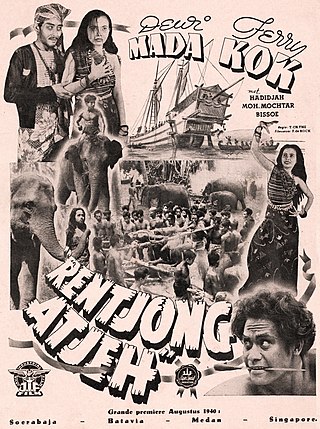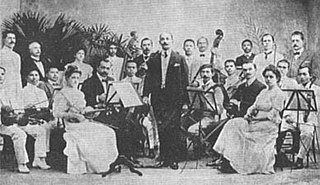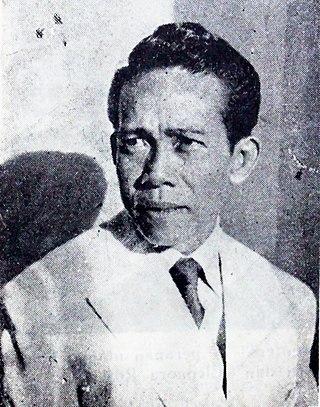
Abisin Abbas, better known by his pseudonym Andjar Asmara, was a dramatist and filmmaker active in the cinema of the Dutch East Indies. Born in Alahan Panjang, West Sumatra, he first worked as a reporter in Batavia. He became a writer for the Padangsche Opera in Padang, where he developed a new, dialogue-centric style, which later spread throughout the region. After returning to Batavia in 1929, he spent over a year as a theatre and film critic. In 1930 he joined the Dardanella touring troupe as a writer. He went to India in an unsuccessful bid to film his stage play Dr Samsi.

Kartinah is a now-lost 1940 romance film from the Dutch East Indies that was written and directed by Andjar Asmara. The film, Andjar's directorial debut, follows a nurse and her superior as they fall in love in the Air Raid Preparation team. Produced by The Teng Chun's New Java Industrial Film, Kartinah was heavily subsidised by the country's government and through product placement. Although it was a critical failure, the new actors signed with the studio for Kartinah gave New Java Industrial Film increased production capabilities.

Ratna Asmara, also known as Ratna Suska, was an Indonesian actress and director. Originally active in theatre, she starred in the romance film Kartinah (1940), which her first husband Andjar directed.
Melati van Agam is a 1931 romance film directed by Lie Tek Swie and produced by Tan's Film. Starring A. Rachman, Neng Titi, Oemar, and Bachtiar Effendi, the two-part film follows the young lovers Norma and Idrus. The film, which may be lost, was reportedly a commercial success, but critical reviews were less favourable.

Bachtiar Effendi was an Indonesian film actor and director who also served as a cultural critic. Beginning his film career in 1930, he made several works for Tan's Film before joining a drama troupe.

Njoo Cheong Seng was a Chinese-Indonesian playwright and film director. Also known by the pen name Monsieur d'Amour, he wrote more than 200 short stories, novels, poems and stage plays during his career; he is also recorded as directing and/or writing eleven films. He married four times during his life and spent several years travelling throughout Southeast Asia and India with different theatre troupes. His stage plays are credited with revitalising theatre in the Indies.

Rentjong Atjeh is a 1940 action film from the Dutch East Indies directed by The Teng Chun. Telling of a group who take revenge against pirates in the Strait of Malacca, it starred Ferry Kock, Dewi Mada, Bissoe, Mohammad Mochtar, and Hadidjah. It was filmed near the shore in Batavia and reused footage from The's earlier work Alang-Alang (1939). Rentjong Atjeh, inspired in part by the Tarzan films, was a commercial success, although it may now be lost.

Gadis Desa is a 1949 comedy from what is now Indonesia written and directed by Andjar Asmara. Starring Basuki Djaelani, Ratna Ruthinah, Ali Joego, and Djauhari Effendi, it follows the romantic hijinks of a village girl who is taken to be a rich man's second wife. The film, produced by a Dutch-run company, is recognised as the first in which future "father of Indonesian film" Usmar Ismail was involved.

Astaman also known as Tirtosari, was an Indonesian actor active from the 1910s until the mid-1970s. He was a leading actor in the influential theatre company Dardanella and, after entering the film industry with 1940s Kartinah, acted in 43 films.
Noesa Penida is a 1941 film from the Dutch East Indies which was directed by Andjar Asmara and produced by The Teng Chun of Java Industrial Film. It tells of a love triangle between two brothers, born to a commoner, and a noble woman.
Djaoeh Dimata is a 1948 film from what is now Indonesia written and directed by Andjar Asmara for the South Pacific Film Corporation (SPFC). Starring Ratna Asmara and Ali Joego, it follows a woman who moves to Jakarta to find work after her husband is blinded in an accident. SPFC's first production, Djaoeh Dimata took two to three months to film and cost almost 130,000 gulden.

Miss Riboet's Orion, originally known as the Orion Opera, was a theatrical troupe active in the Dutch East Indies in the 1920s and early 1930s. Established by the husband and wife team Tio Tek Djien and Miss Riboet, the company travelled throughout the Indies and performed various acts, particularly those with action scenes. It was disbanded in 1942, having lost much of its popularity due to competition with Dardanella.

Tio Tek Djien, also styled T. D. Tio, Jr., was a Chinese Indonesian stage manager and playwright turned film producer.

Ali Joego was a stage and film actor and director active in the Dutch East Indies and Indonesia. During his twenty-year career he appeared in thirty films and directed seven.

Oriental Film was a film production company in Batavia, Dutch East Indies. Established by ethnic Chinese businessman Tjo Seng Han in 1940, it completed four black-and-white films before it was closed in 1941. All the company's films were screened into the 1950s but may now be lost. They were directed by two men, Njoo Cheong Seng and Sutan Usman Karim, and launched the careers of actors such as Dhalia and Soerip.

Toneel is a genre of theatrical drama performance developed in early 20th-century Dutch East Indies. Compared to earlier native musical dramas, such as the Malay bangsawan and Komedie Stamboel, toneel adapted more European stylings, with an emphasis on spoken dialogue and a reduction in the amount of music used during the performance; thus the genre is called toneel, an adaptation of the Dutch word for theatre.

Rempo Urip was an Indonesian film director. He began his career in the theatre, serving as an extra and footballer for the Dardanella theatre company beginning in 1934. After six years and three troupes, Urip entered the film industry, working as a distributor for Oriental Film and assistant director for Java Industrial Film. He returned to the theatre during the Japanese occupation (1942–1945) and national revolution (1945–1949). In 1951 he joined Djamaluddin Malik's Persari as a director, completing thirteen films for the company before it closed in 1958. He continued as a freelance director until 1977.
Devi Dja (1914–1989), known as Miss Dja, was an Indonesian dancer, playwright and film actor in the 1940s. A member of the Dardanella Opera group, founded by her husband, Willy A. Piedro, which toured the Dutch East Indies, she moved with her husband to the US around 1940, remaining there for the rest of her life as a professional entertainer and taking on American citizenship.

Frederik de Kock was an Indonesian actor and singer who was active in the 1930s and 1940s. He was one of the top five stars of Dardanella, along with Devi Dja, Astaman, Tan Tjeng Bok, and Miss Riboet II.
Miss Riboet II, also known as Miss Riboet Muda, was an Indonesian actress and singer who was active from the 1920s until 1950s and was one of the top five stars of Dardanella, along with Devi Dja, Astaman, Tan Tjeng Bok, and Ferry Kock. She was the mother of actress Netty Herawaty and was considered as the part of Classical Indonesian Cinema.
















